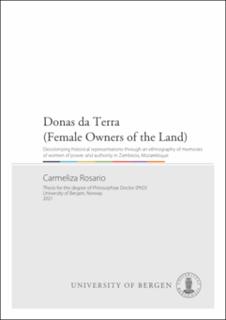| dc.description.abstract | This thesis discusses the missing or underrepresented women of power and authority within the written history of Mozambique’s Zambezi region. It argues that several generations of scholars, both within colonial and postcolonial contexts, have: one, centralized colonialism as a genesis for their narrative; and two, misconstrued the role of women in the region’s societies, particularly those of power and authority. Crucially, the thesis demonstrates that the centralization of colonialism was done by inscribing the history of the region’s peoples from their encounter with the Portuguese. This narrative also tied this region—including terming it “Zambezia”—to the expansion of Portuguese influence and colonial structures. Consequently, in hegemonic narratives the peoples and societies of interest were those that most interacted, adapted or resisted, and eventually were defeated by the Portuguese.
Writing in the immediate decades after independence in 1975, Mozambican postcolonial historians recentralized their narrative towards nation building. Though they added information from oral sources and archaeology to inform this narrative, their focus on anticolonial struggle nonetheless retained the centrality of the colonial encounter. Non-Mozambican historians, most with leftist leanings and professing solidarity with the anticolonial cause, also tended to focus on resistance to, precisely, colonialism. In these narratives too, women were either absent or were conflated within categories such as “freedom fighters”, “workers” or “peasants”. Feminist and women-centered scholars, meanwhile, focused on female subjugation, the centrality of gender and resistance to patriarchal norms, both colonial and indigenous.
This thesis counters and critiques such previous scholarly practice by decentralizing colonialism as the main vector of the narrative. It instead focuses on local cosmological understandings of women and power to elucidate continuities and discontinuities in the sociohistorical trajectories of the Zambezi region. The narrative that emerges is of an unbound “Zambezia,” where different locations relate unevenly to different historical events. The local perceptions of power revealed three categories wielded by women: inherent (members of ruling dynasties), acquired (spouses), and subaltern (labor organizers). These in turn relate to three expressions of power, i.e., ways their societies recognize and distinguish their types of power: metaphysical (rituals and witchcraft), performative (dances), and embodied (clothes and jewelry).
Methodologically, the study alternates between drawing on archival and ethnographic sources, and aims to set these in dialogue with each other. The archival material is used to establish the narrative of the written text. It also serves to identify where women of power and authority have been absent or misconstrued. The ethnographic material is then used to support, challenge, or contradict the existing narrative. The thesis further uses trans-temporal hinges to identify the most important events in the timelines of the different life histories. These show that different field locations have non-linear, discordant historiographies which relate to unconnected temporal and spatial references.
Part 1 of the thesis presents a comprehensive history of the Zambezi region and beyond, highlighting the diversity of its peoples and their mobility, as well as the renaming and reshaping of political organizations over the longue durée. It argues against an imagined “Zambezia” as a coherent social and historical place, as suggested by a historiography that relies heavily on colonial archives. It further argues that the existing historiography has placed undue emphasis on the different colonial structures as a precursor and unitary force of this imagined Zambezia as a bounded social complex.
Part 2 extracts from the archival material categories of women of power from this region and then contrasts these categories with those encountered in the field to examine how specific female authoritative roles were either ignored, misunderstood, or diluted in historical texts. It presents the multiple ways women operated within their societies' hegemonic structures, while critically engaging the feminist and Africanist debates about women and power.
Part 3 presents the life histories of four selected female authoritative actors who embody the three different power types also identified in the archival material. Their life histories further evidence how overarching events described in the region’s historiography produced different outcomes across different spaces within Zambezia. This part also discusses how privileging female informants adds value in highlighting gaps in the scholarly representation of the social and political structures to which they belong.
Part 4 concludes with a discussion of how, through analyzing the past, this thesis is concerned with the present and future representation of former colonial spaces and hegemonic discourses about these spaces. The decolonial lens applied to the analysis of women of power and authority in Zambezia challenges representations of women established by the colonial gaze, which have gone unchallenged both within postcolonial Marxist historiography and feminist and women-centered scholarship.
The thesis looks at women and power in novel ways. First, it looks at how and which women are located within hegemonic social structures and cosmological understandings of reality, in the process, naturalizing the presence of women in authoritative roles across time. In particular, it presents a long-running category of female authority, hitherto viewed primarily within its subalternity, that has been essential in the governing structures of precolonial, colonial and postcolonial societies alike. Second, it adds to the discussion of gender and power by showing that power is not always gendered and how leadership has generally been collaborative and inclusive of both genders. It also shows how marriage has been a source of empowerment for both men and women. Third, it eschews linear and periodical historiography for trans-temporal hinges, which are determined by spatiotemporal relationships established by the informants in the field. Fourth, it proposes decolonial emancipatory possibilities by contrasting epistemologically predefined concepts and how cosmological understandings of such concepts challenge their original assumptions. | en_US |
